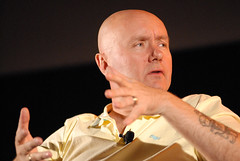“Better together? Yes, certainly, but better independent and free together.”
Bella Caledonia has today published an original article by Irvine Welsh (of Trainspotting fame).
It’s a very thoughtful piece by a writer who has spent a long time in England, and I strongly recommend reading the whole thing.
Here are a few bits that struck a chord with me:
[The British] state has stopped England from pursuing its main mission, namely to build a inclusive, post-imperial, multi-racial society, by forcing it to engage with the totally irrelevant (from an English perspective) distractions of Scotland, Wales and Northern Ireland. From the viewpoint of the Scots, it has foisted thirty-five years of a destructive neo-liberalism upon us, and prevented us from becoming the European social democracy we are politically inclined to be.
[…]
The idea of the political independence of England and Scotland leading to conflict, hatred and distrust is the mindset of opportunistic status-quo fearmongers and gloomy nationalist fantasists stuck in a Bannockburn-Culloden timewarp, and deeply insulting to the people of both countries. Swedes, Norwegians and Danes remain on amicable terms; they trade, co-operate and visit each other socially any time they like. They don’t need a pompous, blustering state called Scandinavia, informing them from Stockholm how wonderful they all are, but (kind of) only really meaning Sweden.
[…]
The Union Jack is the increasingly shrinking fig leaf that strives to cover the growth of an English nationalism and consciousness, which is visible in almost every aspect of life in these islands over the last thirty years. And that, in a post-imperial world, is how it should be, and probably how it has to be. The problem that the Scots, Welsh and Northern Irish have to face, is that they have no place at this party, and neither should they: it just isn’t a great deal to do with them.
It’s a very powerful article, and even more so because Irvine Welsh knows England so well. As he concludes: “Better together? Yes, certainly, but better independent and free together.”

Pingback: Irvine Welsh: “Better together? Yes, certainly, but better independent and free together.” | The Widmann Blog
I very much enjoyed reading this article. I know Southall because it’s en route to my uncle’s house and as a kid we often drove through it — my grandmother always complaining about how it had gone ‘Indian’. One time we drove through and thought it looked a bit of a mess … we didn’t realise until we got home and watched the news that there had been a race riot there. We changed our regular route after that! It was interesting reading a thoughtful article by someone who has an equal love for being in London and Edinburgh. However, it’s yet another pro-independence article tinged with nostalgia for ‘democratic socialism’. The economic liberalism of the past 35 years has had many unpleasant consequences but people forget just how awful things were back in the 70s under ‘democratic socialism’ — which in reality is government support of certain favoured groups which are not necessarily by any means the most needy, at the expense of the most productive parts of the economy, with the sugar-coating of a proclaimed ‘equality’ that is nothing of the sort. If the Independence vision were of the “Celtic Tiger” variety, I would consider being supportive but a Scotland based on 70s political nostalgia would be a disaster.
But don’t you think Scots will only ever sign up for the “Celtic Tiger” when they start collecting their own tax revenues, as opposed to being given a block grant?
I just wish that that were the vision being sold. I think a “Celtic Tiger” approach would be so much more inspiring than ‘we will manage poverty better’.
But most of the people who can vote feel much more enthusiastic about a social-democratic model than about a Celtic Tiger one.
Social democracy requires a strong corporate sector to function economically. The corporates are stagnating whereas the future is with small lean businesses.
I’m not sure that’s true. Denmark has always been dominated by SME’s, not by huge corporations like Sweden, and it was a very social-democratic country for ages (although it’s starting to change).
Interesting. I like looking at Scottish independence through different lenses and I see different things. Through my ‘lean startup’ lens it could be a chance to have a ‘lean startup state’.